Fleurs du Mal Magazine


A timeless, visionary collection of poems from one of China’s most acclaimed poets-now available in English for the first time in a generation and featuring a foreword by his son, contemporary artist and activist Ai Weiwei
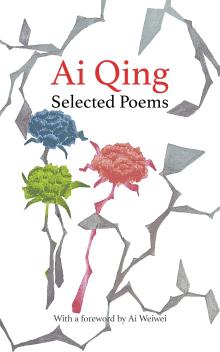 One of the most influential poets in Chinese history, Ai Qing is mostly unknown to Western readers, but his work has shaped the nature of poetry in China for decades. Born between the fall of imperial Manchurian rule and the establishment of the Communist People’s Republic, Ai Qing was at one time an intimate of Mao Zedong.
One of the most influential poets in Chinese history, Ai Qing is mostly unknown to Western readers, but his work has shaped the nature of poetry in China for decades. Born between the fall of imperial Manchurian rule and the establishment of the Communist People’s Republic, Ai Qing was at one time an intimate of Mao Zedong.
He would eventually fall out with the leader and be sentenced to hard labor during the Cultural Revolution, when he was exiled to the remote part of the country known as “Little Siberia” with his family, including his son, Ai Weiwei.
In his work, Ai Qing tells the story of a China convulsing in change, leaving behind a legacy of feudalism and imperialism but uncertain what the future will hold. Breaking with traditional forms of Chinese poetry, Ai Qing innovatively adapted free verse, writing with a simple sincerity in clear lines that could be understood by everyday readers.
Selected Poems of Ai Qing is an extraordinary collection that traces the powerful inner life of this influential poet who crafted poems of protest, who longed for a newer, happier age, and who wrote with a profound lyricism that reaches deep into the heart of the reader.
Selected Poems by Ai Qing (Author),
Ai Weiwei (Introduction), Robert Dorsett (Translator)
Ai Qing is regarded as one of the finest modern Chinese poets, whose free verse was influential in the development of new poetry in China.
Ai Weiwei is one of the world’s most important living artists. Born in 1957, he lives in Cambridge, UK.
Allan H. Barr is the author of a study in Chinese of a literary inquisition in the early Qing dynasty, Jiangnan yijie: Qing ren bixia de Zhuangshi shi’an, and the translator of several books by contemporary Chinese authors, including Yu Hua’s China in Ten Words and Han Han’s This Generation. He teaches Chinese at Pomona College in California.
# new poetry
Selected Poems by Ai Qing (Author),
Ai Weiwei (Introduction),
Robert Dorsett (Translator)
Publisher: Vintage Classics
2 Nov. 2021
Language: English
Hardcover
128 pages
ISBN-10: 1784877662
ISBN-13: 978-1784877668
£12.99
• fleursdumal.nl magazine
More in: #Editors Choice Archiv, #Modern Poetry Archive, - Book News, - Bookstores, Ai Weiwei, Archive A-B, Archive A-B
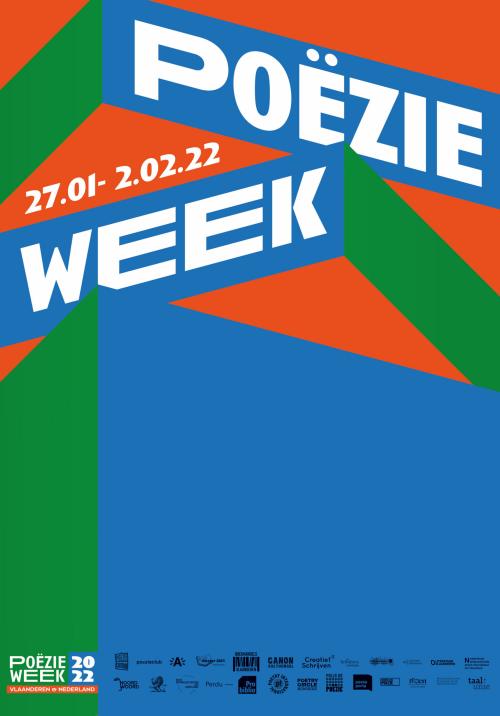
More in: #Modern Poetry Archive, - Audiobooks, - Book Lovers, - Book News, - Bookstores, Art & Literature News, AUDIO, CINEMA, RADIO & TV, CONCRETE , VISUAL & SOUND POETRY, Poëzieweek

The Eviction
In early morning twilight, raw and chill,
Damp vapours brooding on the barren hill,
Through miles of mire in steady grave array
Threescore well-arm’d police pursue their way;
Each tall and bearded man a rifle swings,
And under each greatcoat a bayonet clings:
The Sheriff on his sturdy cob astride
Talks with the chief, who marches by their side,
And, creeping on behind them, Paudeen Dhu
Pretends his needful duty much to rue.
Six big-boned labourers, clad in common freize,
Walk in the midst, the Sheriff’s staunch allies;
Six crowbar men, from distant county brought, –
Orange, and glorying in their work, ’tis thought,
But wrongly,- churls of Catholics are they,
And merely hired at half a crown a day.
The hamlet clustering on its hill is seen,
A score of petty homesteads, dark and mean;
Poor always, not despairing until now;
Long used, as well as poverty knows how,
With life’s oppressive trifles to contend.
This day will bring its history to an end.
Moveless and grim against the cottage walls
Lean a few silent men: but someone calls
Far off; and then a child ‘without a stitch’
Runs out of doors, flies back with piercing screech,
And soon from house to house is heard the cry
Of female sorrow, swelling loud and high,
Which makes the men blaspheme between their teeth.
Meanwhile, o’er fence and watery field beneath,
The little army moves through drizzling rain;
A ‘Crowbar’ leads the Sheriff’s nag; the lane
Is enter’d, and their plashing tramp draws near,
One instant, outcry holds its breath to hear
“Halt!” – at the doors they form in double line,
And ranks of polish’d rifles wetly shine.
The Sheriff’s painful duty must be done;
He begs for quiet-and the work’s begun.
The strong stand ready; now appear the rest,
Girl, matron, grandsire, baby on the breast,
And Rosy’s thin face on a pallet borne;
A motley concourse, feeble and forlorn.
One old man, tears upon his wrinkled cheek,
Stands trembling on a threshold, tries to speak,
But, in defect of any word for this,
Mutely upon the doorpost prints a kiss,
Then passes out for ever. Through the crowd
The children run bewilder’d, wailing loud;
Where needed most, the men combine their aid;
And, last of all, is Oona forth convey’d,
Reclined in her accustom’d strawen chair,
Her aged eyelids closed, her thick white hair
Escaping from her cap; she feels the chill,
Looks round and murmurs, then again is still.
Now bring the remnants of each household fire;
On the wet ground the hissing coals expire;
And Paudeen Dhu, with meekly dismal face,
Receives the full possession of the place.
William Allingham
(1824 – 1889)
The Eviction
• fleursdumal.nl magazine
More in: Allingham, William, Archive A-B, Archive A-B
In her first poetry collection since the award-winning Countries of the Body, Tishani Doshi returns to the body as a central theme, but extends beyond the corporeal to challenge the more metaphysical borders of space and time.
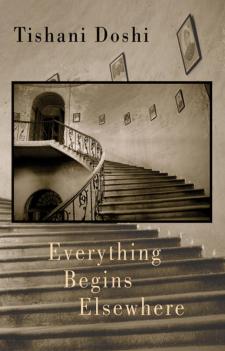 These poems are powerful meditations born on the joineries of life and death, union and separation, memory and dream, where lovers speak to each other across the centuries, and daughters wander into their mothers’ childhoods.
These poems are powerful meditations born on the joineries of life and death, union and separation, memory and dream, where lovers speak to each other across the centuries, and daughters wander into their mothers’ childhoods.
As much about loss as they are about reclamation, Doshi’s poems guide us through an ‘underworld of longing and deliverance’, making the exhilarating claim that through the act of vanishing, we may be shaped into existence again.
Everything Begins Elsewhere was followed by two further collections, Girls Are Coming Out of the Woods in 2018, and A God at the Door in 2021.
These poems move in different directions, as true poetry should. We hear in them joy and sadness, praise and lament, love and disenchantment – simultaneously. Tishani Doshi speaks courageously about herself, about her choices, about the growing shadows. It’s a beautiful book’ – Adam Zagajewski
Tishani Doshi is an award-winning poet and dancer of Welsh-Gujarati descent. She was born in Madras, India, in 1975. She received her masters in writing from the Johns Hopkins University in America and worked in London in advertising before returning to India in 2001 to work with the choreographer Chandralekha, with whom she performed on many international stages. An avid traveller, she has been trekking in the Ethiopian Bale Mountains, visited Antarctica with a group of high-school students, and documented the largest transgender gathering in Koovakam. She has written about her travels in newspapers such as the Guardian, International Herald Tribune, The Hindu and the Financial Times.
She won an Eric Gregory Award for her poetry in 2001. In 2006, she won the All-India Poetry Competition, and her debut collection, Countries of the Body (Aark Arts), won the Forward Prize for Best First Collection. Her first novel, The Pleasure Seekers (Bloomsbury, 2010), was longlisted for the Orange Prize and shortlisted for the Hindu Fiction Award, and has been translated into several languages. Her second poetry collection, Everything Begins Elsewhere, was published by Bloodaxe Books in 2012. Fountainville: new stories from the Mabinogion was published by Seren in 2013. Her third collection, Girls Are Coming Out of the Woods (Bloodaxe Books, 2018), is a Poetry Book Society Recommendation and was shortlisted for the Ted Hughes Award for New Work in Poetry 2018 in the UK, and for the poetry category of the 2019 Firecracker Awards in the US. Her second novel, Small Days and Nights (Bloomsbury, 2019), was shortlisted for the RSL Ondaatje Prize. Her fourth poetry collection, A God at the Door (Bloodaxe Books, 2021), was shortlisted for the 2021 Forward Prize for Best Collection.
Tishani Doshi lives on a beach between two fishing villages in Tamil Nadu with her husband and dogs. She is currently Visiting Associate Professor of Practice, Literature and Creative Writing at New York University, Abu Dhabi. For more information, see her website www.tishanidoshi.com.
# more poetry
Tishani Doshi
Everything Begins Elsewhere
2012
Paperback
Pages: 72
ISBN: 9781852249366
Bloodaxe Books Ltd
£10.99
• fleursdumal.nl magazine
More in: - Book Lovers, - Book Stories, Archive C-D, Archive C-D, Tishani Doshi
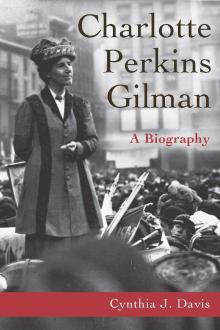
She who is to come
A woman–in so far as she beholdeth
Her one Beloved’s face;
A mother–with a great heart that enfoldeth
The children of the Race;
A body, free and strong, with that high beauty
That comes of perfect use, is built thereof;
A mind where Reason ruleth over Duty,
And Justice reigns with Love;
A self-poised, royal soul, brave, wise and tender,
No longer blind and dumb;
A Human Being, of an unknown splendor,
Is she who is to come!
Charlotte Perkins Gilman
(1860-1935)
She who is to come
Suffrage Songs and Verses
• fleursdumal.nl magazine
More in: # Classic Poetry Archive, Archive G-H, Archive G-H, Feminism
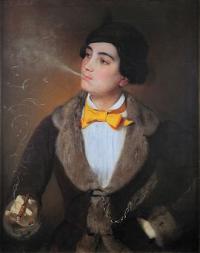
Dithyrambe
Glücklich, wem der Gott der Reben
Seine süßen Gaben beut,
Hüllend um das ganze Leben
Selige Vergessenheit!
Alle finstern Geister weichen,
Aller Fesseln sind wir los,
Herrscher in des Traumes Reichen,
Fühlt der Geist sich frei und groß.
Fort, mit deinen bleichen Zügen,
Träumende Erinnerung!
Deinen Zauber zu betrügen,
Fühl’ ich mächtig mich und jung!
Heiliger Entzückung Gluten
Fach’ ich in der Seele an;
Möchte frei das All’ umfluten,
Wie der alte Ocean!
Stürmt empor, ihr Jugendgeister!
Tanzt um mich in frohen Reih’n!
Immer frischer, immer dreister,
Stürzt ins Leben euch hinein!
Fluch den fremden, starren Mächten,
Die der Menschen Sinn betört;
Die uns martern, die uns knechten,
Die mein ganzes Sein zerstört!
Mächt’ger Gott der süßen Reben,
Spende mir Vergessenheit!
Schenke mir ein neues Leben,
Voll Genuß und Seligkeit!
Schlagt die Gläser all’ in Scherben:
So vergeh’ die alte Welt!
So mag sterben und verderben,
Was das Herz in Fesseln hält!
Louise Aston
(1814-1871)
Die wilde Rose
• fleursdumal.nl magazine
More in: # Classic Poetry Archive, Archive A-B, Archive A-B, Feminism

Verwunschene
In den Armen der Mühle hängen
die bleichen Verwunschenen
Drehen langsam den Stein des Brotes,
Unendlich geduldig.
Rings im Lande jagen die Prasser,
Aber die bleichen Verwunschenen
Mahlen unendlich geduldig das Korn.
Fängt ein Sturm ihre langen Ärmel
Sinken sie stumm in die heilige Erde.
Schicken von neuem bleiche Gesellen
Den Armen der Mühle
Geduldig, unendlich,
Verwunschen.
Bess Brenck-Kalischer
(Betty Levy, 1878-1933)
Verwunschene
• fleursdumal.nl magazine
More in: # Classic Poetry Archive, Archive A-B, Archive A-B

Weerwil
Macht kan harde dingen maar is zo zacht
als spek wanneer het er op aankomt. Ogen
in de rug moeten open blijven want achter
de hoek dralen ongeduldige messendragers.
Grof als de krachtige streken van Permeke
zijn hun bedoelingen. Ze zwijgen instemmend,
zwaar als leugens die nooit ontmaskerd werden.
Bert Bevers
Weerwil
(Uit: Andere taal, Litera Este, Borgerhout, 2010)
Bert Bevers is dichter en schrijver.
Hij woont en werkt in Antwerpen (Be).
• fleursdumal.nl magazine
More in: Archive A-B, Archive A-B, Bevers, Bert
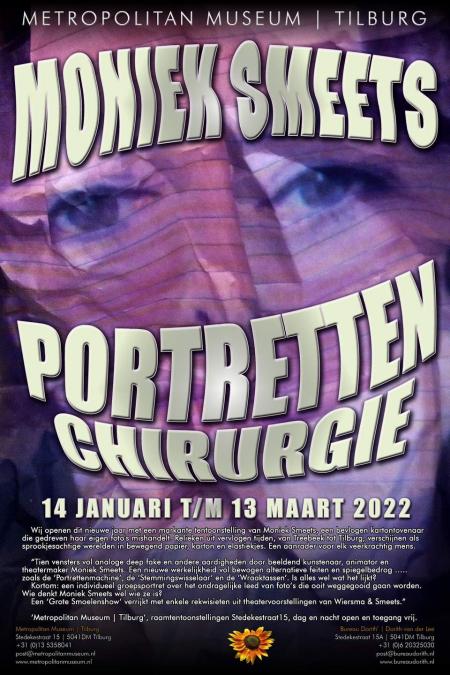
Het Metropolitan Museum | Tilburg, de raamtentoonstellingen aan de Stedekestraat, opent dit nieuwe jaar met een markante tentoonstelling van Moniek Smeets, een bevlogen kartontovenaar die gedreven haar eigen foto’s mishandelt.
Relieken uit vervlogen tijden, van Treebeek tot Tilburg, verschijnen als sprookjesachtige werelden in bewegend papier, karton en elastiekjes. Een aanrader voor iedere veerkrachtige Tilburger.
“Tien vensters vol analoge deep fake en andere aardigheden door beeldend kunstenaar, animator en theatermaker Moniek Smeets. Een nieuwe werkelijkheid vol bewogen alternatieve feiten en spiegelbedrog … zoals de ‘Portrettenmachine’, de ‘Stemmingswisselaar’ en de ‘Wraaktassen’. Is alles wel wat het lijkt?
Kortom: een individueel groepsportret over het ondraaglijke leed van foto’s die ooit weggegooid gaan worden. Wie denkt Moniek Smeets wel wie ze is?
Een ‘Grote Smoelenshow’ verrijkt met o.a enkele rekwisieten uit theatervoorstellingen van Wiersma & Smeets.”
De tentoonstelling ‘Portrettenchirurgie’ van Moniek Smeets is van vrijdag 14 januari t/m zondag 13 maart 2022 te zien in het ‘Metropolitan Museum | Tilburg’, raamtentoonstellingen aan de Stedekestraat 15 te Tilburg, dagelijks dag en nacht geopend en de toegang is vrij.

‘PORTRETTENCHIRURGIE’
Moniek Smeets
14 januari t/m 13 maart 2022,
dagelijks, dag en nacht, toegang vrij
‘Metropolitan Museum | Tilburg’
Stedekestraat 15, 5041DM Tilburg
telefoon: 013 5358041 / 06 20325030
email: post@metropolitanmuseum.nl
website: www.metropolitanmuseum.nl
• fleursdumal.nl magazine
More in: Archive S-T, Art & Literature News, AUDIO, CINEMA, RADIO & TV, Exhibition Archive, Metropolitan Museum Tilburg
Met zijn nieuwe dichtbundel Komijnsplitsers zet Marieke Lucas Rijneveld opnieuw een grote stap in zijn dichterschap.
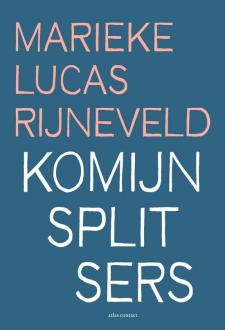 In acht afdelingen onderzoekt Rijneveld wat het betekent om te wonen: in een huis, in jezelf en in verhoudingen tot anderen. Wie of wat heb je nodig om een compleet mens te zijn?
In acht afdelingen onderzoekt Rijneveld wat het betekent om te wonen: in een huis, in jezelf en in verhoudingen tot anderen. Wie of wat heb je nodig om een compleet mens te zijn?
In een van de gedichten wordt verhaald over het verlangen één ruimte te zijn; iemand zoekt een brandtrap uit deze dag, trekt in plaats van een grijs vest een jongen aan.
De vrees om iemand te worden die de ander niet kan hebben – ‘om de verkeerde mens om je beenderen te vormen’ – vormt het grootste gevaar voor het maar al te herkenbare en hoopvolle verlangen naar groei.
In een taal die naar adem hapt en het zweet van het voorhoofd veegt, staat ‘Komijnsplitsers’ als een huis. In 2020 won Marieke Lucas Rijneveld de International Booker Prize voor ‘De avond is ongemak’.
Komijnsplitsers
Marieke Lucas Rijneveld
Uitgever: Atlas Contact
Taal: Nederlands
Bladzijden: 104 pp.
Bindwijze: Paperback
Genre: Poezie
ISBN 9789025471200
Verwacht 20-1-2022
€19,99
# new poetry
Komijnsplitsers
Marieke Lucas Rijneveld
• fleursdumal.nl magazine
More in: #Editors Choice Archiv, - Book News, - Bookstores, Archive Q-R, Archive Q-R, Art & Literature News, Marieke Lucas Rijneveld, Rijneveld, Marieke Lucas

Maoriland
Maoriland, my mother!
Holds the earth so fair another?
O, my land of the moa and Maori,
Garlanded grand with your forests of kauri,
Lone you stand, only beauty your dowry,
Maoriland, my mother!
Older poets sing their frozen
England in her mists enshrouded;
Newer lands my Muse has chosen,
‘Neath a Southern sky unclouded;
Set, a solitary gem,
In Pacific’s diadem.
Land of rugged white-clad ranges,
Standing proud, impassive, lonely;
Ice and snow, where never change is,
Save the mighty motion only
Where through valleys seared and deep
Slow the serpent glaciers creep.
Land of silent lakes that nestle
Deep as night, girt round with forest;
Water never cut by vessel,
In whose mirror evermore rest
Green-wrapt mountain-side and peak,
Reddened by the sunset’s streak.
Land of forests richly sweeping,
By the rata’s red fire spangled;
Where at noonday night is sleeping,
Where, beneath the creepers tangled,
Come the tui’s liquid calls
And the plash of waterfalls.
Land where fire from Earth’s deep centre
Fights for breath in anguish furied,
Till she from the weight that pent her
Flings her flames out fiercely lurid;
Where the geysers hiss and seethe,
And the rocks groan far beneath.
Land of tussocked plain extending
In the distant blue to mingle,
Where wide rivers sigh unending
Over weary wastes of shingle;
Cold as moonlight is their flow
From the glacier-ice and snow.
Land where torrents pause to dally
‘Neath the toi’s floating feather,
Where the flax-blades in the valley
Whisper stealthily together,
And within the cabbage-trees
Hides the dying evening breeze.
Land where all winds whisper one word,
“Death!” — though skies are fair above her.
Newer nations white press onward:
Her brown warriors’ fight is over —
One by one they yield their place,
Peace-slain chieftains of her race.
Land where faces find no furrow,
With the flush of life elated;
Where no grief is, save the sorrow
Of a pleasure that is sated;
Land of children lithe and slim,
Fresh of face and long of limb.
Land of fair enwreathëd cities,
Wide towns that the green bush merge in;
Land whose history unwrit is —
Memory hath no chaster virgin!
Land that is a starting place
For a newer, nobler race.
Maoriland, my mother!
Holds the Earth so fair another?
O, my land of the moa and Maori,
Garlanded grand with your rata and kauri,
Lone you stand, only beauty your dowry,
Maoriland, my mother!
Arthur Adams
(1872-1936)
Maoriland
• fleursdumal.nl magazine
More in: Adams, Arthur, Archive A-B, Archive A-B

Delight
I’ve been delighting in your face
since the Eureka mess of our embrace,
the cork of fizzing kissing taken place,
the sexual notation of blushing staves,
a lust-compass flashing up radar blips.
Sloppy corners, edges in melted clips
of our manic laughter, on risky ships,
in the city’s darkness and muddy trips,
naked tangles on private sandy strips,
isolated scrub lands and forest bits,
disused canal tunnel with freezing tits,
stopping the car in shadowy lay-bys,
alleyways, echoing blissed-out cries,
she delighted, ripping open my flies.
And through our lustiness a miracle came,
the pneumatic forces created the near-same,
through the acrobatic propagated struggle
in the hospital you pushed out of the bubble
when we saw you delight in your life force.
Now we are celebrating the main course
of us all together, as a loving source,
of the wonderful blended mix,
of our delight, our scented lives transfixed
we have built the home as well as the bricks.
Vincent Berquez
Delight
Vincent Berquez is a London–based artist and poet. He has published in Britain, Europe, America and New Zealand. His work is in many anthologies, collections and magazines worldwide (f.i. fleursdumal.nl).
# new book of poetry by Vincent Berquez:
The Sound of Blossom Falling
Author: Vincent Berquez
Paperback
Language: English
86 pages
Publisher: Cyberwit.net
2021
ISBN-10: 9390601096
ISBN-13: 978-9390601097
£10.89
• fleursdumal.nl magazine
More in: #Editors Choice Archiv, Archive A-B, Archive A-B, Art & Literature News, Berquez, Vincent, Vincent Berquez
Thank you for reading Fleurs du Mal - magazine for art & literature